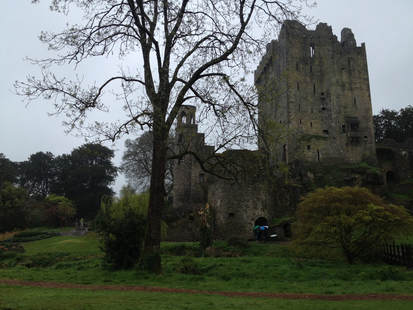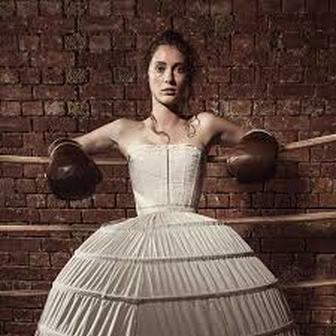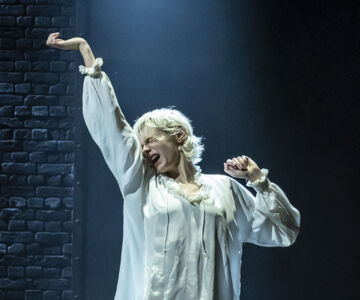 Ireland's Beautiful Countryside: County Cork (and Ballymaloe)by Randi / October 26, 2018
Ireland's Beautiful Countryside: County Cork (and Ballymaloe)by Randi / October 26, 2018It’s Theatre Thursday! Today we are talking about the new play ‘The Sweet Science of Bruising’, which had its world premiere at London’s Southwark Playhouse in October.
London has seen its fair share of plays depicting women of the Victorian era, but rarely have we seen them kick some ass. In Joy Wilkinson’s new play ‘The Sweet Science of Bruising’, four women from extremely different walks of life decide to swap evening gloves for boxing gloves and enter the ring. A refuge from the confines of every other aspect of their lives, the turn to boxing – and the attempt to win the title of Lady Boxing Champion – gives the women some semblance of control and power in their restricted lives. But the kickassy nature of this premise quickly gets weighed down by the play’s overly ambitious endeavor to shoehorn every possible bit of tragedy and drama into the story.
Or, really, the four stories. Each of the four female protagonists is given a good deal of focus, and while it’s wonderful to see four female protagonists in a play, it’s impossible to give each of their characters enough of a story without sacrificing the balance of the work. In the attempt to do the impossible – have four main stories while keeping the work sensible and cohesive – the play instead feels lopsided and inconsistent, and most of all overstuffed. Some of their trajectories seem to come out of nowhere or with too little to support the drama. And most of all, the writer seems hell-bent on reminding the audience that women of this time cannot have happy endings or even happy bits in the middle; it is all dire and dreary, all the time. We know that women were treated like garbage throughout most of human history; it’s not entirely necessary to remind us of that to such a degree that it makes the whole enterprise suchhh a bummer.
The opening of the play was actually the most brilliant part, and it was almost shame to realize it was a play within a play. One of our lady boxers, Violet Hunter (Sophie Bleasdale) is at the theatre with her rich Aunt George (Caroline Harker) and cousin (Alice Kerrigan, playing a few small roles in the show which is a shame because she has the most stage presence and ability of anyone). Two men on their stage comically fight over a sick woman that they both want to marry, and it was hilariously (and purposefully) overwrought and super enjoyable. That’s where the laughs end though, because our show is about fostering melancholy across all aspects of life. Violet is a nurse, but she wants to study to become a doctor. It’s not possible for her to do so in England, it seems? So she wants to go to France to study. Her aunt isn’t the most supportive of this idea, so Violet asks the doctor she works for. Doctor man of course just wants to marry her, and if he marries her he doesn’t want her to work because she wimminfolk, so Violet’s in a bit of a pickle. She decides to start boxing! At first I think it’s a way to earn the money she needs for her studies, but then it seems like she forgets about doctoring and just wants to box, which doesn’t seem supported by the story.
Next we have prostitute Matilda Blackwell (Jessica Regan), an Irish woman who, like all prostitutes in plays, is down on her luck and it’s depressing. Apparently, she works at a newspaper and so always has ink on her hands, but the newspaper industry was dying even then, I guess, so she also has to pros. (‘Her mother was a pros…’) She also works as a nanny? Damn she has some work ethic, at least, but she can’t get a break or make ends meet. She decides to start boxing! However, when the Old Professor of Boxing (true story) doesn’t choose her for literally ONE big matchup, her prospects are over?? And so she resorts to letting men beat her? It’s VERY confusing and odd and I didn’t like her story at all because I was like, wait, so she couldn’t do this one fight, so instead of just doing what she’s always been doing, she does worse stuff? Does not compute.
One of Matilda’s regular customers at the prossing station is a ‘gentleman’ (Joe Coen) who is married to a lovely wife named Anna Lamb (Kemi-Bo Jacobs). Anna’s husband is a sumbitch and you really want him to die the whole time, even aside from the whole-seeing-a- prostitute-while-married thing. He treats Anna terribly, threatens her, and makes her timid and afraid for herself and her children at all times. She decides to start boxing! Of course, we can’t let her horrible shitbag husband find out, and of course he does. Kemi-Bo is gorgeous and is really well cast for Anna’s gentility. But Anna’s story is the saddest and most depressing. However, it isn’t very effective: instead of making us feel for Anna and her situation, what we fell is more like JESUS CHRIST STOP PILING ALL THIS DEPRESSING STUFF ON TOP OF EACH OTHER LET US BREEEEATHE.
Lastly, we have Polly Stokes (Fiona Skinner), a poor, sickly but strong girl who was orphaned as a bebbeh (her words) and adopted by a family. She was raised with an adopted brother who is now her lover. It’s rull weird guys, like even if you aren’t blood, you’ve still been siblings your entire lives, that is grosssss. Her brotherlover is a boxer so she has trained with him her whole life. She’s a natural and tough as nails. So she decides to start boxing! Will her brotherlover stand by her when she proves to be a champion in her own right? Gross. The actress is clearly really strong so they make her do push-ups for us and she jump-ropes to show the ‘training montage’. I’ve seen several shows recently where they make actresses jump rope to show that they are getting into shape and I’m over it. Polly was probably the most compelling character, because the actress was so well cast and was giving it absolutely her all, but she looked exactly like an old friend of mine so I was very distracted.
I would have loved if at least half of the show was about these women finding strength in their new ventures, but as soon as they throw their very first punches, it’s like their worlds crash around them even more. What’s the moral of that, then? That women should not even think about having agency because it’ll make things worse? If they found some strength and felt a little powerful even for a short time and then realized it wasn’t sustainable in their society, that would have been believable and still enjoyable as a story, even if it wasn’t entirely accurate. But to have them suffer even more when they decide to exert any agency over their own lives feels cruel. Even so, it’s a very interesting work, and I hope future productions happen, albeit with some reigning in of the ambition and focusing on more achievable goals.
The opening of the play was actually the most brilliant part, and it was almost shame to realize it was a play within a play. One of our lady boxers, Violet Hunter (Sophie Bleasdale) is at the theatre with her rich Aunt George (Caroline Harker) and cousin (Alice Kerrigan, playing a few small roles in the show which is a shame because she has the most stage presence and ability of anyone). Two men on their stage comically fight over a sick woman that they both want to marry, and it was hilariously (and purposefully) overwrought and super enjoyable. That’s where the laughs end though, because our show is about fostering melancholy across all aspects of life. Violet is a nurse, but she wants to study to become a doctor. It’s not possible for her to do so in England, it seems? So she wants to go to France to study. Her aunt isn’t the most supportive of this idea, so Violet asks the doctor she works for. Doctor man of course just wants to marry her, and if he marries her he doesn’t want her to work because she wimminfolk, so Violet’s in a bit of a pickle. She decides to start boxing! At first I think it’s a way to earn the money she needs for her studies, but then it seems like she forgets about doctoring and just wants to box, which doesn’t seem supported by the story.
Next we have prostitute Matilda Blackwell (Jessica Regan), an Irish woman who, like all prostitutes in plays, is down on her luck and it’s depressing. Apparently, she works at a newspaper and so always has ink on her hands, but the newspaper industry was dying even then, I guess, so she also has to pros. (‘Her mother was a pros…’) She also works as a nanny? Damn she has some work ethic, at least, but she can’t get a break or make ends meet. She decides to start boxing! However, when the Old Professor of Boxing (true story) doesn’t choose her for literally ONE big matchup, her prospects are over?? And so she resorts to letting men beat her? It’s VERY confusing and odd and I didn’t like her story at all because I was like, wait, so she couldn’t do this one fight, so instead of just doing what she’s always been doing, she does worse stuff? Does not compute.
One of Matilda’s regular customers at the prossing station is a ‘gentleman’ (Joe Coen) who is married to a lovely wife named Anna Lamb (Kemi-Bo Jacobs). Anna’s husband is a sumbitch and you really want him to die the whole time, even aside from the whole-seeing-a- prostitute-while-married thing. He treats Anna terribly, threatens her, and makes her timid and afraid for herself and her children at all times. She decides to start boxing! Of course, we can’t let her horrible shitbag husband find out, and of course he does. Kemi-Bo is gorgeous and is really well cast for Anna’s gentility. But Anna’s story is the saddest and most depressing. However, it isn’t very effective: instead of making us feel for Anna and her situation, what we fell is more like JESUS CHRIST STOP PILING ALL THIS DEPRESSING STUFF ON TOP OF EACH OTHER LET US BREEEEATHE.
Lastly, we have Polly Stokes (Fiona Skinner), a poor, sickly but strong girl who was orphaned as a bebbeh (her words) and adopted by a family. She was raised with an adopted brother who is now her lover. It’s rull weird guys, like even if you aren’t blood, you’ve still been siblings your entire lives, that is grosssss. Her brotherlover is a boxer so she has trained with him her whole life. She’s a natural and tough as nails. So she decides to start boxing! Will her brotherlover stand by her when she proves to be a champion in her own right? Gross. The actress is clearly really strong so they make her do push-ups for us and she jump-ropes to show the ‘training montage’. I’ve seen several shows recently where they make actresses jump rope to show that they are getting into shape and I’m over it. Polly was probably the most compelling character, because the actress was so well cast and was giving it absolutely her all, but she looked exactly like an old friend of mine so I was very distracted.
I would have loved if at least half of the show was about these women finding strength in their new ventures, but as soon as they throw their very first punches, it’s like their worlds crash around them even more. What’s the moral of that, then? That women should not even think about having agency because it’ll make things worse? If they found some strength and felt a little powerful even for a short time and then realized it wasn’t sustainable in their society, that would have been believable and still enjoyable as a story, even if it wasn’t entirely accurate. But to have them suffer even more when they decide to exert any agency over their own lives feels cruel. Even so, it’s a very interesting work, and I hope future productions happen, albeit with some reigning in of the ambition and focusing on more achievable goals.






